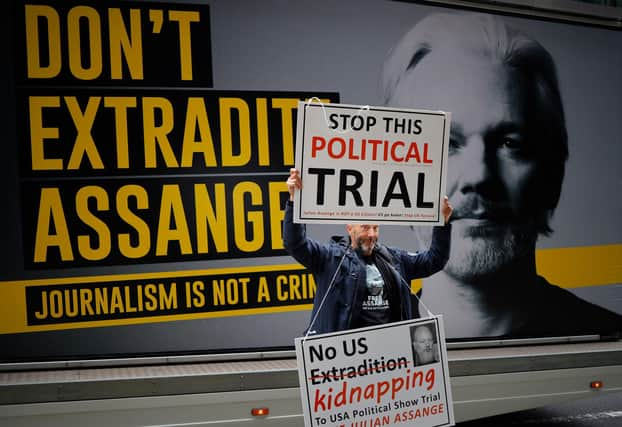Julian Assange: Despite Joe Biden's election, US is still trying to extradite Wikileaks founder and the ramifications are huge – Dr Paul Arnell


From climate change advocates to family, friends and supporters of Julian Assange, hopes were pinned on the new president. Biden’s administration has indeed taken some important decisions. The US has re-joined the Paris climate change accord, for example.
Sadly, for Assange, his supporters and free press advocates, the change of administration has not affected the plight of the founder of Wikileaks. The request for his extradition not been withdrawn. Their hopes have not materialised.
Advertisement
Hide AdAdvertisement
Hide AdWhat has happened in the case since Biden assumed the presidency is that the US has sought to overturn the decision in January by Westminster Magistrates’ Court blocking his extradition. The first step in that process is to get permission, or leave, to appeal.
Arguments in support of and against an appeal have been considered by a High Court judge and leave to make one has been granted. Lawyers for the US will have been allowed to argue why aspects of the judgment of District Judge Baraitser were wrong.
Assange’s case and his detention in Belmarsh prison in London are set to continue for the foreseeable future. His fate is as uncertain as ever.
There are several answers to the question of why this has happened. In a general sense, the US case against Assange has not changed.
He remains charged with 18 counts related to unlawfully obtaining and disclosing classified US national security information. The charges are found in a US grand jury indictment pre-dating the election of Biden.
The US extradition request was also made well before the election, in June 2019. The new administration, from this perspective, changed nothing.
Legally, the appeal was permitted to proceed because the High Court judge decided that there was an arguable case for it.
Leave to appeal, though, has no bearing on whether it will ultimately succeed. Rather, the judge found that, on balance, aspects of the District Court’s judgment merit reconsideration. The most significant aspect of which related to US assurances.
Advertisement
Hide AdAdvertisement
Hide AdAccordingly, on appeal the High Court will decide whether the District Court’s view on the US’s promises about the treatment Assange would receive for his mental health concerns was wrong.
The ramifications of the decision to grant permission to appeal are significant. For Assange himself, they could be huge. It may be the difference between life imprisonment and freedom to live at large with his partner and children.
For extradition law and practice, the appellate evaluation of the US assurances may bring into question the mutual trust between the two countries. This forms a cornerstone of their special relationship.
For advocates of press freedom, a successful appeal and Assange’s subsequent conviction would send a chilling message to journalists around the world that the long arms of American law loom large.
For proponents of efficient and effective international criminal justice, Assange’s possible extradition is a reassuring signal that both countries continue to cooperate in the fight against alleged transnational crime.
Ultimately, the most significant ramification of the US appeal being allow to proceed is that everything remains to play for in the extradition case of Julian Assange.
Dr Paul Arnell, Law School, Robert Gordon University, Aberdeen
